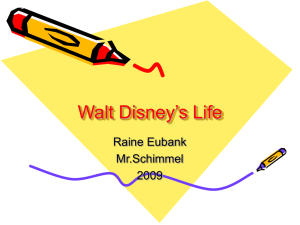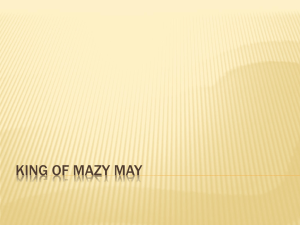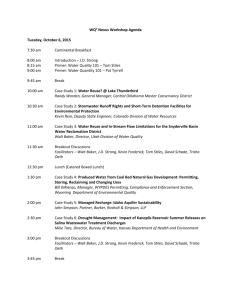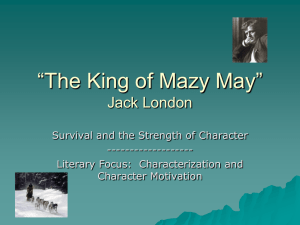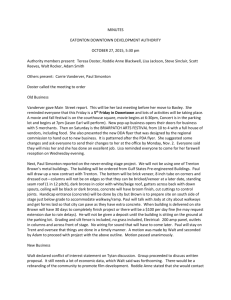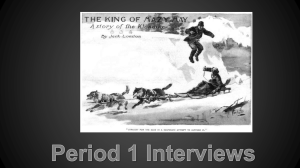Lachney_Response_3
advertisement
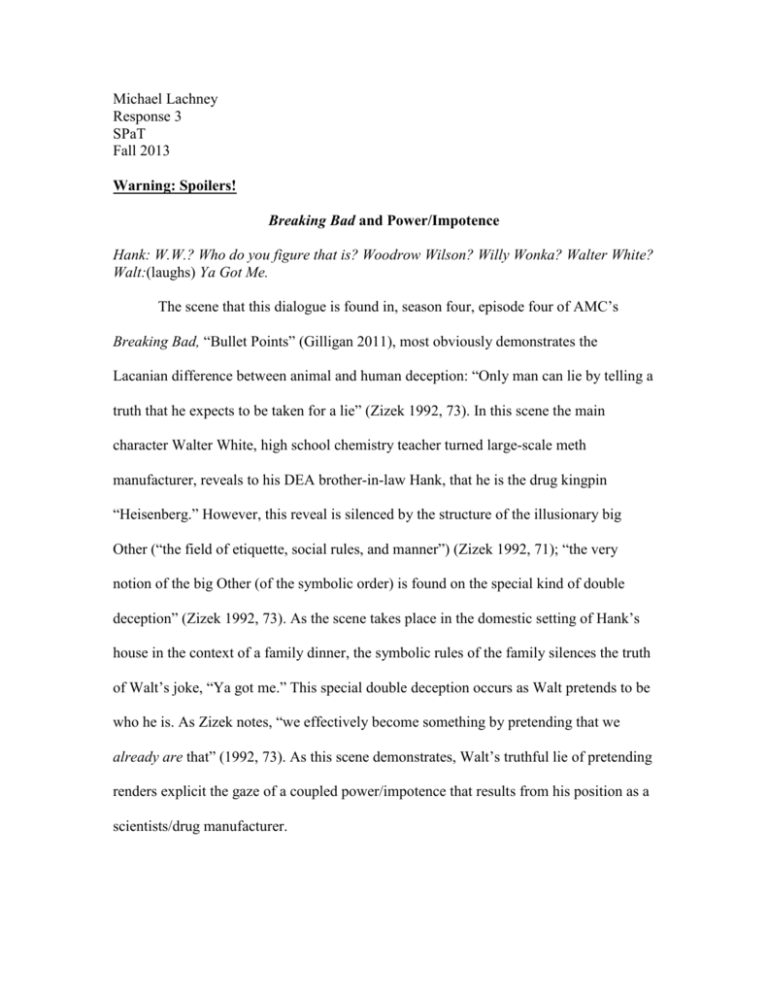
Michael Lachney Response 3 SPaT Fall 2013 Warning: Spoilers! Breaking Bad and Power/Impotence Hank: W.W.? Who do you figure that is? Woodrow Wilson? Willy Wonka? Walter White? Walt:(laughs) Ya Got Me. The scene that this dialogue is found in, season four, episode four of AMC’s Breaking Bad, “Bullet Points” (Gilligan 2011), most obviously demonstrates the Lacanian difference between animal and human deception: “Only man can lie by telling a truth that he expects to be taken for a lie” (Zizek 1992, 73). In this scene the main character Walter White, high school chemistry teacher turned large-scale meth manufacturer, reveals to his DEA brother-in-law Hank, that he is the drug kingpin “Heisenberg.” However, this reveal is silenced by the structure of the illusionary big Other (“the field of etiquette, social rules, and manner”) (Zizek 1992, 71); “the very notion of the big Other (of the symbolic order) is found on the special kind of double deception” (Zizek 1992, 73). As the scene takes place in the domestic setting of Hank’s house in the context of a family dinner, the symbolic rules of the family silences the truth of Walt’s joke, “Ya got me.” This special double deception occurs as Walt pretends to be who he is. As Zizek notes, “we effectively become something by pretending that we already are that” (1992, 73). As this scene demonstrates, Walt’s truthful lie of pretending renders explicit the gaze of a coupled power/impotence that results from his position as a scientists/drug manufacturer. The whole sequence of scenes in Hank’s house frames a tension between the surface bonds of the family unit and Walt’s discovery that the APD and Hank know about the murder of a meth cook, Gail, that is a result of Walt’s actions. Hank and Marie invite Walt, Skyler (Marie’s sister) and their two children over for dinner. Hank jokingly shows a video of Gail singing to Walt and his son Walt Jr., announcing that this is the Heisenberg he has been looking for. Walt sits on the end of the bed, Hank and Walt Jr. laugh at Gail’s video in the background. The camera dollies in from an eye-level medium shot to a close-up of Walt’s face. Here Walt is impotent, “reduced to the role of the passive [witness] of [his] adversary’s actions” (Zizek 1992, 72), as he cannot allude to his knowledge or knowing of this individual without blowing his cover. Yet, in the next scene the first shot is a low-angle fade-in of Walt sitting at the dinner table. While remaining impotent under the family dinner etiquette of big Other, looking up at Walt the low-angle connotes a sense of standing over the viewer. Yet, on another level this “gaze denotes at the same time power (it enables us to exert control over the situation, to occupy the position of the master) and impotence (as bearers of a gaze, we are reduced to the role of the passive witness to the adversary’s action) (Zizek 1992, 72). Walt has gained knowledge about what the authorities know about his meth business, giving him the power of foresight. However, this direct coupling of impotence/power is not made explicit until the next episode. In the end of the next episode the family is again at the dinner table, yet Walt invokes his scientific authority to exert power over Hank’s perception of Gail and the investigation. Hank explains how Gail was a genius, as the camera again dollies into Walt’s face. Walt is impotent, yet, speaks up to suggest that Gail’s “brilliance looks like nothing more than just simple rote copying… maybe this genius of yours is still out there,” of which he is referring to himself. First, this scene reveals the scientific gaze as one of power/impotence. Walt as part of the family in domestic settings is often reduced to impotence. In a binary relationship with Hank, Walt is the outcast egghead, always quite and never drawing attention to himself. This is the opposite of Hank, who is loud and likes to show off his masculinity through his DEA badge. Yet, it is Walt’s position as a chemist that gives him power. Alluding to his scientific expertise, Walt couples his passive role as a family member with his active role of power as a scientist to suggest that Gail’s work was not impressive. The role of scientist provides Walt with the illusionary structure (big Other) of authoritative objectivity. Yet, this objectivity can also be seen as impotent, passive in the large actions and agency of politics and society. In this way Walt comes to represent the scientific gaze as a coupling of power/impotence. This scene is also a reminder that the impotent gaze is never “dual, it is never a simple confrontation between the subject and an adversary,” there is always a third element, that is ignorant to the big Other’s social game. Zizek names these three elements of the impotent gaze, which align with the characters at the dinner table. First, the “innocent third who sees all but fails to grasp the significance of what he sees” (Zizek 1992, 72). The innocent third in this scene is Hank. Hank sees all that is in front of him regarding Gail and Walt’s suggestion, yet fails to see the motivation for the suggestion. Second, the “agent whose act - under the fail guise of simply following the rules of the social game taking place - deals a deceive blow to the adversary” (Zizek 1992, 72). Walt, working under the structures of big Other is the agent. He works within the rules of the cat and mouse/family game to first deal a blow to Hank’s ideas but also to his family, in that he raises suspicions of his own illegal activities. Finally, “the adversary himself, the impotent observer who apprehends perfectly the real implication of the act, but is nonetheless commended to the role of the passive witness, since his counteraction would provoke the suspicion of the innocent, ignorant big Other” (Zizek 1992, 72). The impotent observer in this case is Skyler, who comes to represent the family. If this is the case, then Walt is acting against and throwing blows at the family. Skyler is well aware what Walt is doing when he suggest Heisenberg is still out there. She even later uses this case to suggest that he wants Hank to figure it out. In this structure, the adversary for Walt is the family, who is reduced to passivity. If this is the case, than pretending to be who he is, not a family man but a drug manufacturer, is a continuous becoming throughout the series. Not only is Walt in a binary relationship with Hank, but with his entire family. In this way, “we can indulge in our secret wars only as long as the Other does not take cognizance of them, for at the moment that the Other can no longer ignore them, the social bonds dissolve itself. A catastrophe ensues, similar to the one instigated by the child’s observation that the emperor is naked” (Zizek 1992, 73). References: Žižek, Slavoj. Looking awry: An introduction to Jacques Lacan through popular culture. MIT Press, 1992.
